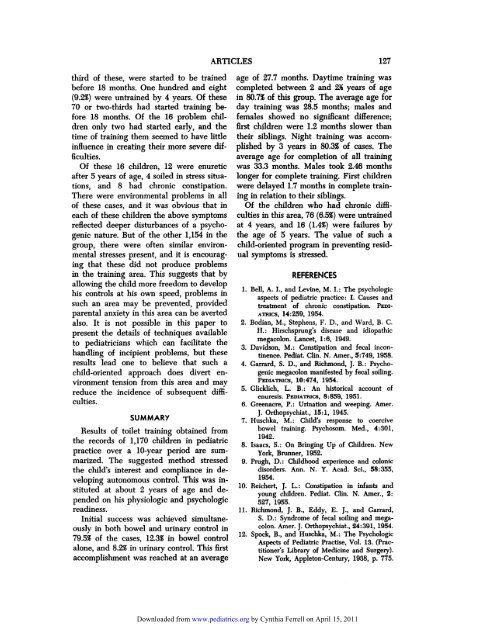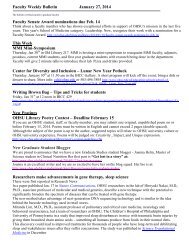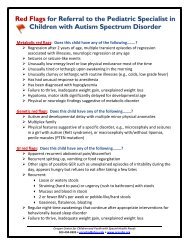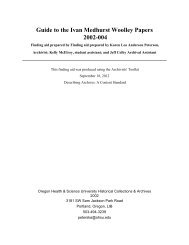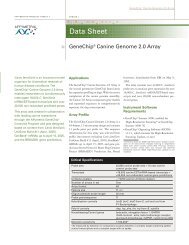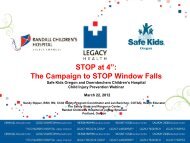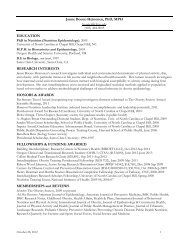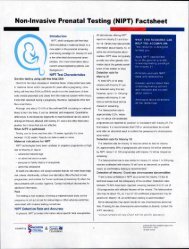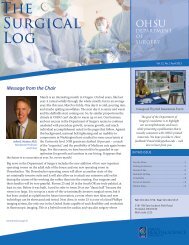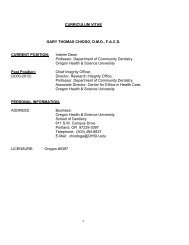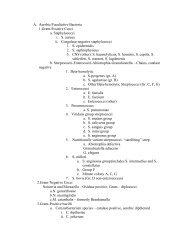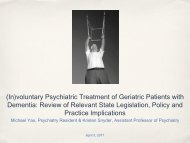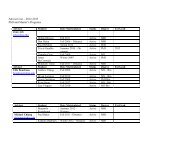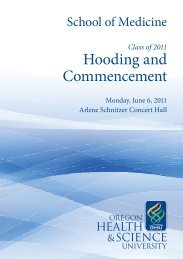1962;29;121-128 Pediatrics T. Berry Brazelton A CHILD-ORIENTED ...
1962;29;121-128 Pediatrics T. Berry Brazelton A CHILD-ORIENTED ...
1962;29;121-128 Pediatrics T. Berry Brazelton A CHILD-ORIENTED ...
You also want an ePaper? Increase the reach of your titles
YUMPU automatically turns print PDFs into web optimized ePapers that Google loves.
third of these, were started to be trained<br />
before 18 months. One hundred and eight<br />
(9.2%) were untrained by 4 years. Of these<br />
70 or two-thirds had started training be<br />
fore 18 months. Of the 16 problem chil<br />
dren only two had started early, and the<br />
time of training them seemed to have little<br />
influence in creating their more severe dif<br />
ficubties.<br />
Of these 16 children, 12 were enuretic<br />
after 5 years of age, 4 soiled in stress situa<br />
tions, and 8 had chronic constipation.<br />
There were environmental problems in all<br />
of these cases, and it was obvious that in<br />
each of these children the above symptoms<br />
reflected deeper disturbances of a psycho<br />
genic nature. But of the other 1,154 in the<br />
group, there were often similar environ<br />
mental stresses present, and it is encourag<br />
ing that these did not produce problems<br />
in the training area. This suggests that by<br />
allowing the child more freedom to develop<br />
his controls at his own speed, problems in<br />
such an area may be prevented, provided<br />
parental anxiety in this area can be averted<br />
also. It is not possible in this paper to<br />
present the details of techniques available<br />
to pediatricians which can facilitate the<br />
handling of incipient problems, but these<br />
results bead one to believe that such a<br />
child-oriented approach does divert en<br />
vironment tension from this area and may<br />
reduce the incidence of subsequent diffi<br />
culties.<br />
SUMMARY<br />
Results of toilet training obtained from<br />
the records of 1,170 children in pediatric<br />
practice over a 10-year period are sum<br />
marized. The suggested method stressed<br />
the child's interest and compliance in de<br />
veloping autonomous control. This was in<br />
stituted at about 2 years of age and de<br />
pended on his physiologic and psychobogic<br />
readiness.<br />
Initial success was achieved simubtane<br />
ously in both bowel and urinary control in<br />
79.5% of the cases, 12.3% in bowel control<br />
alone, and 8.2% in urinary control. This first<br />
accomplishment was reached at an average<br />
ARTICLES 127<br />
age of 27.7 months. Daytime training was<br />
completed between 2 and 2% years of age<br />
in 80.7% of this group. The average age for<br />
day training was 28.5 months; males and<br />
females showed no significant difference;<br />
first children were 1.2 months slower than<br />
their siblings. Night training was accom<br />
plished by 3 years in 80.3% of cases. The<br />
average age for completion of all training<br />
was 33.3 months. Males took 2.46 months<br />
longer for complete training. First children<br />
were delayed 1.7 months in complete train<br />
ing in relation to their siblings.<br />
Of the children who had chronic diffi<br />
culties in this area, 76 (6.5%)were untrained<br />
at 4 years, and 16 (1.4%) were failures by<br />
the age of 5 years. The value of such a<br />
child-oriented program in preventing resid<br />
ual symptoms is stressed.<br />
REFERENCES<br />
1. Bell, A. I., and Levine, M. I. : The psychologic<br />
aspects of pediatric practice : I. Causes and<br />
treatment of chronic constipation. Pzm<br />
ATRICS, 14:259, 1954.<br />
2. Bodian, M., Stephens, F. D., and Ward, B. C.<br />
H. : Hirschsprung's disease and idiopathic<br />
megacolon. Lancet, 1 :6, 1949.<br />
3. Davidson,M.: Constipationand fecal incon<br />
tinence. Pediat. Clin. N. Amer., 5:749, 1958.<br />
4. Garrard, S. D., and Richmond, J. B. : Psycho<br />
genic megacolon manifested by fecal soiling.<br />
Pznwrmcs, 10:474, 1954.<br />
5. Glicklich, L. B.: An historical account of<br />
enuresis. PEDIATRICS, 8 :859, 1951.<br />
6. Greenacre,P.: Urinationand weeping.Amer.<br />
J. Orthopsychiat., 15:1, 1945.<br />
7. Huschka, M. : Child's response to coercive<br />
bowel training. Psychosom. Med., 4:301,<br />
1942.<br />
8. Isaacs, S.: On Bringing Up of Children. New<br />
York, Brunner, 1952.<br />
9. Prugh, D.: Childhood experience and colonic<br />
disorders. Ann. N. Y. Acad. Sd., 58:355,<br />
1954.<br />
10. Reichert, J. L. : Constipation in infants and<br />
young children. Pediat. Clin. N. Amer., 2:<br />
527, 1955.<br />
11. Richmond, J. B., Eddy, E. J., and Garrard,<br />
S. D. : Syndrome of fecal soiling and mega<br />
colon. Amer. J. Orthopsychiat., 24:391, 1954.<br />
12. Spock, B., and Huschka, M.: The Psychologic<br />
Aspects of Pediatric Practise, Vol. 13. (Prac<br />
titioner's Library of Medicine and Surgery).<br />
New York, Appleton-Century, 1938, p. 775.<br />
Downloaded from<br />
www.pediatrics.org by Cynthia Ferrell on April 15, 2011


